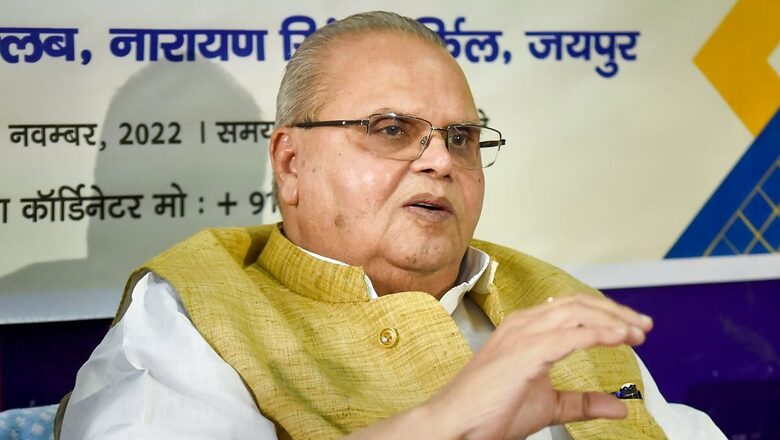
views
Former Jammu & Kashmir Governor Satyapal Malik’s “explosive” interview to The Wire is in reality a damp squib. It exposes him more than his “opponents”. And with him is exposed the deeply entrenched Left-liberal (an oxymoron term otherwise) ecosystem whose disdain for the current dispensation at the Centre often makes it blind to India’s national interest, especially vis-à-vis Pakistan.
In an interview with journalist Karan Thapar, the former Governor said that the casualties at Pulwama happened because the Centre refused to provide aircraft to CRPF personnel stranded in Jammu as the national highway connecting it to Srinagar was closed due to snowfall.
It’s sheer opportunism on Malik’s part to come out in the open on the issue. For, he is an accused party. If one keeps aside the aircraft issue for a while, the fact of the matter is that the attack was carried out by a former Kashmiri stone-pelter, Adil Dar, whose activities were known to the police and other security agencies. Being the Governor of the erstwhile state (now a Union Territory), which was then under the Governor’s Rule after the BJP pulled out of the Mehbooba Mufti-led PDP government in June 2018, the J&K police worked directly under Malik.
Let’s go to the interview transcript:
Karan Thapar (KT): And that car (laden with explosives) was roaming around on the roads of Kashmir?
Satyapal Malik (SM): Specifically, in that area.
KT: For how many days?
SM: I think it was 10-12 days at the very least.
KT: For 10-12 days a car loaded with RDX was roaming around the streets and villages of Kashmir and no one knew?
SM: No one knew. No one intercepted.
KT: Well this is a terrible intelligence failure as well?
SM: 100 percent
KT: 100 percent. So we have a security lax, roads not being manned and then an intelligence lax as well. The incompetence is that of the Indian system.
SM: Yes.
KT: You’re saying yes.
SM: Yes, even I am responsible for that. I was the head of the state at that time.
So, an RDX-laden car roamed around Kashmir for “10-12 days”. And the J&K Police, which then worked directly under Malik, couldn’t intercept it. He knew his culpability and thus conceded he too was responsible for the attack. But then the eminent journalist came to his rescue by putting a blanket on his role, and instead focusing on the Centre’s failure.
Let’s go to the transcript:
KT: The whole Indian system failed?
SM: Yes, everybody failed at that time.
KT: From the Home Minister down?
SM: Everybody failed.
At least the interviewer should be given the credit for not saying: “From the Prime Minister down!” The truth, however, is that the old entrenched ecosystem — call it Nehruvian, Left-liberal, et al — is so blinded by anti-Modism that it often fails to distinguish between the idea of India and the notion of government: Its revulsion for the Modi dispensation has translated in the demonisation of India. Governments come and go, but the idea of India is non-negotiable. To put a question mark on the nation itself, especially vis-à-vis another, whose very raison d’être is anti-India-ism, is a deplorable act.
Let’s revisit the transcript again:
KT: You’re saying an important thing, right now. They (CRPF) asked the Home Ministry for an aircraft, and the Home Ministry refused?
SM: Yes, and I told this to the Prime Minister in the evening that this has happened due to our fault. Had we given the aircraft, this wouldn’t have happened. To which he told me that I should keep quiet now.
KT: So the Prime Minister told you to keep quiet about all of your faults?
SM: I told him that it was our fault.
KT: When you had told the Prime Minister that this had happened because of us, that they had asked for the aircraft and the Home Ministry did not give them, and the Prime Minister asked you to keep quiet. He said don’t let people know we made a mistake.
SM: Doval also said this to me.
KT: Who?
SM: Doval, Ajit Doval.
KT: He also told you to keep quiet?
SM: He has been my classmate so we can talk about anything to each other. He said Satyapal, don’t say this.
KT: So what you’re saying, is both the Prime Minister—
SM: I can share with you that I realised that this entire onus is going to be put on Pakistan so it’s better to be quiet on the subject now.
KT: So this was in some way, a clever policy of the government that blame Pakistan—
SM: Exactly.
KT: And we will get credit, and that will help our election.
SM: Exactly.
Besieged Pakistan cannot expect a better defence than this! It is but natural for a government to minimise its role in a catastrophe, especially of the scale of Pulwama. But to twist the entire narrative to say that this was “a clever policy of the government that blames Pakistan”, was to say that these jihadis accidentally fell from the skies and that the real and the only villain was the Government of India. Thankfully, Malik did concede the sinister Pakistani role in the Pulwama attack.
This is how the interview unfolded:
KT: You said another really important thing, 3-4 minutes back that you realised when the PM and Mr Doval asked you to keep quiet on the matter, that the blame would be shifted to Pakistan because they felt it would help their election. Was Pakistan, or Pakistani militants or Pakistani tanzeems actually responsible or did we make that up?
SM: The amount of explosives provided to that fellow could not be done internally. It was Pakistan only that arranged it. But the failure was on our part, mine too, that we could not locate that a car in that area was roaming around carrying so much explosive material.
Let’s now come to the holier-than-thou Malik who said that he would have resigned had he been the Home Minister. He would also have resigned had he been the Defence Minister. But he wouldn’t resign when he was the Governor, the administrative head of J&K, under whose watch this dastardly terrorist incident took place.
Malik didn’t resign. In fact, he didn’t show any sign of discomfort for the next eight months. The Pulwama attack took place on February 14, 2019. Malik remained the Governor of J&K till October 30, 2019. So, he was fine with the Pulwama incident, and any repentance as such was an afterthought. More so because he didn’t find anything wrong in accepting other gubernatorial assignments from the same government. From October 3, 2019, to August 18, 2020, and then from August 18, 2020, to October 3, 2022, he was the Governor of Goa and Meghalaya, respectively. You can’t have it both ways, Mr Malik!
Coming to the main charge that Malik levelled: That the Home Ministry’s denial of aircraft to CRPF officials led to their assassination in Pulwama. But as Rahul Pandita’s article in the Open magazine suggests, “the availability of aircraft would have made no (major) difference to the final outcome of what the Pakistan-based terrorist organisation Jaish-e-Mohammed had set out to do around that time”.
The killings could have been avoided “if intelligence agencies had prior information about Farooq and his band of men. Had Adil Dar not slipped from the watch, perhaps Pulwama could have been avoided”. As Pandita writes, “The attack was planned to damage Prime Minister Modi’s credibility right before the Lok Sabha elections to be held a few weeks later. But since it created a big furore in India and led to the Balakot strike… ‘the thing’ (attack) had ended up helping Modi instead of damaging him.”
Lt Gen KJD ‘Tiny’ Dhillon (retd) writes in his just-released book, Kitne Ghazi Aaye, Kitne Ghazi Gaye: My Life Story, “…Out of 100 incidents ostensibly planned by terrorists, timely collection and interpretation of intelligence inputs ensures that 99 are not allowed to happen, signifying a 99 percent success rate for the intelligence agencies in their operations. Since those incidents are averted completely we rarely or never talk about them.”
Pulwama falls into that 1 percent category of terrorism where security forces and intelligence failed. Satyapal Malik’s endeavour to use this incident to target the government of the day, and worse, bail out the criminal enterprise called Pakistan, cannot be justified. More so because he was the one who presided over the tragedy in Pulwama, being the head of the erstwhile state. It’s a case of having one’s cake and eating it too.
The author is Opinion Editor, Firstpost and News18. He tweets from @Utpal_Kumar1. Views expressed are personal.
Read all the Latest Opinions here




















Comments
0 comment